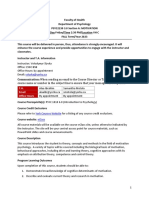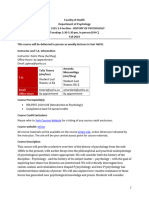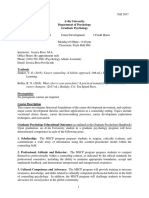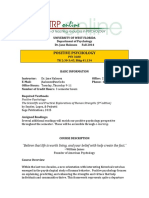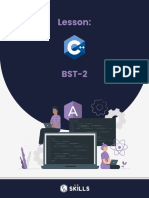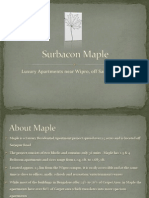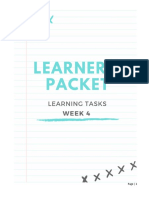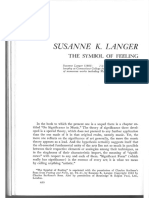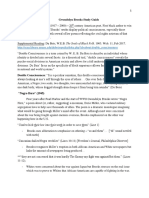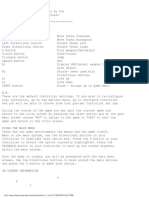Faculty of Health
Department of Psychology
PSYC 3000 3.0 Section B: PROFESSIONALISM AND COMMUNICATION Y
Wednesday (biweekly) 11:30-2:30
Stong College 212
2023-24
This course will be delivered through in-person lectures scheduled biweekly through the
term. We meet on alternating Tuesdays, as this is a 3.0 credit course that is offered
throughout the full year. This schedule allows you to work on assignments on alternating
weeks and allows you to have a year-long connection to Dr. Desrocher. Discussion will be an
important part of the learning experience. Small group breakouts will allow us to talk about
the topics together and provide a means of peer feedback on upcoming assignments.
In bad weather or if Dr. Desrocher is ill lectures will be delivered through Zoom. This is also
the link for virtual office hours. The link is included here:
https://yorku.zoom.us/j/93821734330?pwd=VkJsTjUwakh6MTROMGhXMlRScTRWUT09
Instructor and T.A. Information
Instructor: Mary Desrocher, Ph.D., C.Psych. (she/her)
Office Hours: Wednesdays 11:30-2:30 (alternating weeks) via Zoom link above or Room 124 BSB
Email: mdesroch@yorku.ca
T.A.: Maria Orlando, B.Sc., MA candidate (she/her)
Office Hours: By appointment
Email: morlando@yorku.ca
Course Prerequisite(s): Course prerequisites are strictly enforced
• HH/PSYC 1010 6.00 (Introduction to Psychology), with a minimum grade of C
• HH/PSYC 2010 3.00 (Writing in Psychology)
• HH/PSYC 2020 6.00 (Statistical Methods I and II) or substitutes
• HH/PSYC 2030 3.00 (Introduction to Research Methods)
• Completed at least 54 earned credits
Course Credit Exclusions
Please refer to York Courses Website for a listing of any course credit exclusions.
Course website: eclass.yorku.ca
All course materials will be available on the course EClass site, unless otherwise indicated by Dr
Desrocher. The site will be your central access point for lecture slides, readings, assignment
rubrics, and links to websites, videos, and other instructional materials.
1
�Course Description
PSY3000 is designed to build Psychology students' professionalism and communication skills.
This will be accomplished through teaching, class discussions, and applied assignments that are
relevant to working within the university context. Students will learn about the current and
evolving norms, customs, and ideologies of academic psychology. They will further develop the
skills that they will need to become strong applicants for competitive graduate programs.
Students will learn about professional communication with potential supervisors, providing and
receiving feedback, understanding professional ethics, exploring and choosing post-graduate
opportunities, and skills and tasks that are necessary for applying to and thriving in a future
graduate program and/or career in psychology. Students will learn about and practice various
forms of communication within academic psychology, including verbal and written
presentations, email communications, personal statements, scholarship applications, and
creating engaging talks for broad audiences interested in psychology.
Program Learning Outcomes
Upon completion of this course, students should be able to:
1. Demonstrate ability to work effectively with peers,
2. Demonstrate professional integrity,
3. Demonstrate ability to reflect upon and manage own learning,
4. Demonstrate knowledge and critical assessment of norms, customs and ideologies of
academic psychology, and
5. Demonstrate effective oral and written communication.
Specific Learning Objectives
What students will engage in and take away from the course include:
1. Capacity for autonomous learning,
2. Development of an identity as an academic psychologist,
3. Development of professional integrity,
4. Professional self-presentation – while being your own true self -, and
5. Effective communication of academic work in various forms (e.g., talks, written
academic papers, fellowship applications).
Recommended Text and Readings
• https://apastyle.apa.org/products/publication-manual-7th-edition
• The 7th edition of the APA style text has added materials on writing for students and is
an invaluable resource for students and faculty alike. This is strongly recommended as
something you will use for years to come and is worth the investment. This text is
available for purchase at the bookstore, and there are online resources on this website.
2
� • Readings will be provided in EClass with the relevant topics.
• Other suggested resources are available free to students at the Canadian Psychological
Association Student Portal: https://cpa.ca/students/resources/
Course Requirements and Assessment:
Assessment Due Date Weighting
Learning Assignment 1 – September 27 5%
Information Sheet
Learning Assignment 2 – CV review November 1 5%
Learning Assignment 3 – Personal November 30 5%
Statement Outline
Personal Statement January 10 15%
Learning Assignment 4 – Reflecting January 24 5%
on Career Goals
Learning Assignment 5 – Funding February 7 5%
Proposal Outline
Funding Proposal April 8 15%
Presentation – 5-minute talk February 28, March 13, March 27 20%
Interview Practice Date to Be Chosen By Student 15%
Participation – in small discussion Evaluation at End of Course 10%
groups, emailing, forums (quality is
more important than quantity)
Total 100%
Description of Assignments
Please see the course schedule table at the end for descriptions of all assignments. These will
be due at the start of the following class, as per the dates in the table above.
Class Format and Attendance Policy
Students are encouraged to attend class in-person, but accommodations will be made for those
who are unable to attend due to illness or family emergencies. Attendance will be noted
informally, rather than through formal checks. If you are having difficulties with attending the
course meetings, please do make a time to speak to Dr. Desrocher about your situation.
Grading as per Senate Policy
The grading scheme for the course conforms to the 9-point grading system used in
undergraduate programs at York (e.g., A+ = 9, A = 8, B+ = 7, C+ = 5, etc.). Assignments will bear
either a letter grade designation or a corresponding number grade (e.g. A+ = 90 to 100, A = 80
to 89, B+ = 75 to 79, etc.)
For a full description of York grading system see the York University Undergraduate Calendar –
Grading Scheme for 2023-24
3
�Late Assignments
It is expected that students will attend all classes, or inform Dr. Desrocher of extenuating
circumstances. Attendance will be in-person unless accommodations have been made due to
illness or inability to travel to class. If you are ill, stay home. Documentation is not necessary, as
per university COVID-19 policies, beyond an email 24 hours prior to class. Otherwise,
participation marks may be affected.
Time management is a professional skill, and it is expected that students will submit
assignments on or before the assigned due date. If you have any problems with deadlines,
please do contact Dr. Desrocher to discuss extensions. Below is the policy if students do not
provide documentation for extensions:
• Late learning assignments will have 1 out of 5 points deducted (for a maximum possible
grade of 4/5) if they are submitted 24 hours after the due date, and will have 2 out of 5
points deducted (for a maximum possible grade of 3/5) if the assignment is received
with 48 hours after the due date. Beyond 48 hours, the student will receive a grade of
0/5 on this assignment.
• Late personal statements, scholarship research proposals, or presentations will have
10% of the grade deducted for each calendar day that the assignment is late.
Add/Drop Deadlines
For a list of all important dates please refer to: Fall/Winter 2023-24 Important Dates
Fall (Term Year (Term Winter (Term
F) Y) W)
Last date to add a course without permission of
Sept. 20 Sept. 20 Jan. 22
instructor (also see Financial Deadlines)
Last date to add a course with permission of
Sept. 28 Sept. 28 Jan. 31
instructor (also see Financial Deadlines)
Drop deadline: Last date to drop a course without
Nov. 8 Feb. 8 Mar. 11
receiving a grade (also see Financial Deadlines)
Course Withdrawal Period (withdraw from a course
Nov. 9 - Dec. Feb. 9 - April March 12 -
and receive a grade of “W” on transcript – see note
5 8 April 8
below)
Add and Drop Deadline Information
There are deadlines for adding and dropping courses, both academic and financial. Since, for
the most part, the dates are different, be sure to read the information carefully so that you
understand the differences between the sessional dates below and the Refund Tables.
4
�You are strongly advised to pay close attention to the "Last date to enrol without permission of
course instructor" deadlines. These deadlines represent the last date students have
unrestricted access to the registration and enrolment system.
After that date, you must contact the professor/department offering the course to arrange
permission.
You can drop courses using the registration and enrolment system up until the last date to drop
a course without receiving a grade (drop deadline).
You may withdraw from a course using the registration and enrolment system after the drop
deadline until the last day of class for the term associated with the course. When you withdraw
from a course, the course remains on your transcript without a grade and is notated as 'W'. The
withdrawal will not affect your grade point average or count towards the credits required for
your degree.
Information on Plagiarism Detection
Because this course does not have traditional assignments, software for plagiarism detection
will not be used. If, as a student, you are concerned about the possibility of plagiarism, more
information is available at: https://spark.library.yorku.ca/academic-integrity-using-and-citing-
sources/
Electronic Device Policy
Students will be encouraged to use their devices as part of class discussions. For example,
looking up graduate programs and finding resources to share with each other. It is hoped that
your attention will be on the course content, but we all know that devices are tempting. When
possible, keep your phones on silent/vibrate, and use laptops/tablets for following along with
the slides and shared links.
Academic Integrity for Students
York University takes academic integrity very seriously; please familiarize yourself with
Information about the Senate Policy on Academic Honesty.
It is recommended that you review Academic Integrity by completing the Academic Integrity
Tutorial and Academic Honesty Quiz
Academic Accommodation for Students with Disabilities
While all individuals are expected to satisfy the requirements of their program of study and to
aspire to do so at a level of excellence, the university recognizes that persons with disabilities
may require reasonable accommodation to enable them to do so. The university encourages
students with disabilities to register with Student Accessibility Services (SAS) to discuss their
accommodation needs as early as possible in the term to establish the recommended academic
accommodations that will be communicated to Course Directors as necessary.
5
�Please let me know as early as possible in the term if you anticipate requiring
academic accommodation so that we can discuss how to consider your accommodation needs
within the context of this course.
https://accessibility.students.yorku.ca/
Excerpt from Senate Policy on Academic Accommodation for Students with Disabilities
1. Pursuant to its commitment to sustaining an inclusive, equitable community in which all
members are treated with respect and dignity, and consistent with applicable
accessibility legislation, York University shall make reasonable and appropriate
accommodations in order to promote the ability of students with disabilities to fulfill the
academic requirements of their programs. This policy aims to eliminate systemic
barriers to participation in academic activities by students with disabilities.
All students are expected to satisfy the essential learning outcomes of courses.
Accommodations shall be consistent with, support and preserve the academic integrity of the
curriculum and the academic standards of courses and programs. For further information
please refer to: York University Academic Accommodation for Students with Disabilities Policy.
Course Materials Copyright Information
These course materials are designed for use as part of the PSYC 3000 course at York University
and are the property of the instructor unless otherwise stated. Third party copyrighted
materials (such as book chapters, journal articles, music, videos, etc.) have either been licensed
for use in this course or fall under an exception or limitation in Canadian Copyright law.
Copying this material for distribution (e.g. uploading material to a commercial third-party
website) may lead to a violation of Copyright law. Intellectual Property Rights Statement.
Course Schedule
Note that classes are scheduled to consider Fall Reading Week, October 7-13, and Winter
Reading Week, February 17-23. In addition, Dr. Desrocher may be at conferences or
professional meetings. This is why biweekly may become triweekly. In all, there are 12 course
meetings. Please note the dates carefully in your calendar.
Date Topic for Meeting and Description
Sept 13 Introductions
- We will introduce ourselves, talk about my course expectations and goals, and you
will all share your goals for the course.
- We will walk through the syllabus together to address any questions you may have.
What is Professionalism?
- We will talk about our definitions of professionalism, what it is and what it is not.
- A reading is provided online in EClass.
PREPARATION FOR CLASS: Bring your enthusiasm. ☺
6
�LEARNING ASSIGNMENT 1 To Submit on EClass September 27 – worth 5%
Submit your Information Sheet (provided in EClass) through the Portal. This sheet will provide Dr.
Desrocher and Maria Orlando with some knowledge about you as a student and help us personalize your
experience.
Sept 27 Finding a Research Supervisor
- How to decide who to approach.
- What to include, not to include in an email to professors
- Attachments – transcript and CV
Being a Supervisee
- How do you prepare for working with a professor?
- The importance of planning, agendas for meetings, and setting clear expectations.
- How to balance research experience with other commitments.
Peer Feedback
- How to provide feedback to others in an objective way.
- Balancing critique with helpful information.
- How to receive feedback and take what is useful.
PREPARATION FOR CLASS: Prepare a draft email to a professor you would like to work
with in a research context. We will have pairs or small groups of students share emails
with each other to provide feedback. We will then reconvene and talk about your
experiences with providing each other feedback and moving forward with contacting
professors.
Oct 18 Curriculum Vitae Workshop
- What are the key parts of a C.V.?
- What makes a good C.V.?
- What should you not include?
- How to make your C.V. stand out?
PREPARATION FOR CLASS: Bring an existing resume or CV and we will work in small
groups to polish our documents. We will come together at the end and discuss what we
have shared with each other.
LEARNING ASSIGNMENT 2 To Submit On EClass November 1 – worth 5%
Submit your polished Curriculum Vitae. We will provide feedback on the document so you can use for
applications to labs, grad programs, etc.
7
�November 1 Personal Statement
- A statement of your experience, that goes beyond the CV
- We will discuss what to include and not include in the personal statement.
- Relevant research experience, clinical/applied experience, skills.
- What skills and knowledge would you like to grow if you receive entry into a
graduate program of your choice?
We will discuss personal statement or statements of intent for academic MA/PhD
programs but will also consider statements for counselling or other programs.
PREPARATION FOR CLASS: Be prepared to discuss your career goals, experiences you
have to date, and those you want to get in the coming months and years prior to making
decisions about graduate applications.
LEARNING ASSIGNMENT 3 To Submit on EClass November 29 – worth 5%
Provide a point form version of your personal statement. Criteria for what to include are in the lecture
slides and will be posted clearly on EClass. You will receive feedback to use toward the larger personal
statement assignment due on November 29.
Nov 15 Finding a Career Path in Psychology
- We will talk about the differences between clinical PhD programs,
clinical/counselling MA/MEd and PsyD programs, non-clinical psychology MA/PhD
programs, and other types of graduate programs.
- We will talk through the components of the application and, for research intensive
programs, what to look for in an ideal program.
- Graduate students here at York University will speak about their experiences
applying to and being in graduate school in psychology.
- We will discuss how to become a competitive applicant, writing entrance exams if
required, deciding on programs/schools, applying for funding.
Following up on Personal Statements
- You will talk through your plans for your personal statement in small groups.
- We will talk through challenges as a larger class.
- Please have your notes from the last learning assignment and your CV on hand,
ideally in a format that you can screen share with others as needed.
PREPARATION FOR CLASS: Think of some questions you would want to ask graduate
students.
8
�PERSONAL STATEMENT Due on EClass January 10 End of Day – 15%
This is the final version of the statement. This should be written in paragraph format as per lecture
instructions. There will be flexibility in content allowed, personalized to your career goals.
Nov 29 Emailing Potential Thesis or Graduate Supervisors (specialized honours) or Contacting
Professionals to Work with (all students)
- Talking through readiness to apply to potential thesis supervisors.
- Who will you contact? What do you want to include in your email? How long should
your communication be?
- We will discuss how to find someone who has research you are interested in doing,
or may be open to research ideas you have.
- We will also discuss why professors might not respond and whether to follow up.
- The fit between your interests for future education and what might make sense now
will be part of our discussion.
- We will discuss interviewing for research or applied positions and how to prepare.
Interviewing
- What to expect when you interview for graduate programs versus jobs
- Tips on your preparation for interviews.
- Balancing being “professional” and being yourself
PREPARATION FOR CLASS: Be prepared to share your experiences in prior interviews.
We will share tips with each other.
INTERVIEW PRACTICE WITH FEEDBACK – In person or online – worth 15% - DUE BY END OF THE COURSE
(no later than April 8 which is the last day of courses)
You will set up an interview session – 20 to 30 minutes with Dr. Desrocher – at an agreed upon time. This
can be during office hours, during the exam period in December, in the new year, at any point that fits in
our schedules and allows you to feel ready. For those who wish to complete this earlier in the course, you
can make arrangements with Dr. Desrocher for a time in the first term.
- Choose a scenario you would like to interview for related to Psychology (volunteer position,
independent research project, thesis, graduate program)
- Prepare to meet with Dr. Desrocher and be interviewed for your position of choice
- You will receive feedback right away about how the interview went, your strengths, and things to
work on for future interviews.
- This will be at least a grade of 11/15 for all of you (unless you do not do the assignment) – nerves will
not be marked (anxiety varies and is to be expected to some degree) - 12/15 reflects a solid interview
with 2 key things to work on, 13/15 is a strong interview with 1 key thing to work on, 14/15 is a really
great interview with little to work on, and 15/15 is “perfect” (hard to achieve in reality).
9
�Jan 10 Writing a Funding Proposal
- We will talk about funding for graduate programs.
- We will focus on two main sources for eligible students: Ontario Graduate
Scholarships (OGS) and Tri-Council graduate scholarships.
- We will talk about what makes for a great research proposal when applying for
funding and how to increase your chances of being funded.
- We will share ideas about what to include.
- If you aren’t interested in graduate school, bursaries require similar proposals and
there are many shared requirements.
PREPARATION FOR CLASS: Come with ideas of where you might apply after you finish
your degree. Sharing ideas with each other will be helpful in thinking about projects you
might want to explore. If you have a professor in mind for volunteer work or grad school,
find a paper of theirs that might help you tailor your research idea.
LEARNING ASSIGNMENT 4 Due on EClass January 24 – worth 5%
Having been in the course for a term now, where do you see yourself next year? Two years from now?
Five years from now? What kinds of programs are you looking for after your BA/BSc? Is Psychology
something you want to continue? Do you want to do clinical work, research or both? Have you explored
your options?
Write a 1 page single spaced document that addresses these questions. The goal is to share with us your
thoughts on where you want to be. We will provide you feedback on resources that are tailored to your
goals to help you as you plan into the future.
Jan 24 Giving a Great Talk
- We will talk about informal communication and formal communication as well as
broad versus specific research talks.
- What makes a good talk?
- What detracts from a talk?
-
PREPARATION FOR CLASS: Select a 3 Minute Thesis (3MT) or TED talk (psychology-
relevant, and includes research findings) that you think is effective or ineffective. We
will share these in our small groups.
- Please come prepared to engage in discussion and share your thoughts on your
selected 3MT or TED talk with the class. If you find one that is less effective, please
reflect on why. Try to focus on the talk itself, and how it is presented, more than the
content.
- We will start talking about how an abbreviated talk relates to presentation of
research findings and work on a 3MT format that you will use for your presentations
on the final couple of days of the course.
- Be prepared to choose a presentation date. (first come first served)
10
�LEARNING ASSIGNMENT 5 Due on EClass February 7 - worth 5%
This is your outline for the funding proposal. Provide a point form set of points you wish to include in the
final draft which will be due April 8. Criteria can be found in the lecture on January 10.
Feb 7 Professional Ethics/ Clinical versus research ethics
- We will explore ethics from the perspective of a clinician
- We will also explore ethics from the perspective of research
- Discussions of inclusive language and respect for those we are working with will be
key to the take home messages
Check In On Experiences
- We will also take some time to discuss people’s progress at finding research
experiences for the coming year, and answer questions or concerns that have arisen
from these experiences.
Preparation for the Class Presentations
- Concise communication of results is important and much more common than long
lectures. This is a skill to learn.
- We will have time to discuss tips for how to hone the presentations for the next two
weeks.
- Grades will be based on a combination of peer and instructor feedback.
PREPARATION FOR CLASS: Come with your ideas for your talks. We will have time for
sharing ideas in small groups.
FUNDING PROPOSAL Due on EClass April 8 – worth 15%
This will be in paragraph format, as per the requirements discussed in class in January.
Feb 28 Class Presentations – worth 20%
– No more than 15 per day.
– In-class 3-minute thesis.
This will be like a conference presentation series.
Mar 13 Class Presentations
– No more than 15 per day.
Mar 27 Class Presentations
– No more than 15 per day.
11



